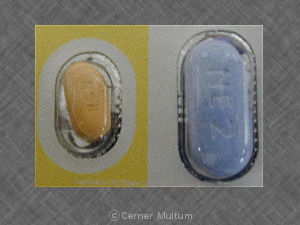Calcium Carbonate / Risedronate Side Effects
Medically reviewed by Drugs.com. Last updated on Mar 22, 2024.
Applies to calcium carbonate / risedronate: oral kit.
Important warnings
This medicine can cause some serious health issues
You should not use this medicine if you have low levels of calcium in your blood (hypocalcemia), or a problem with the movement of muscles in your esophagus.
Do not take a calcium carbonate and risedronate tablet if you cannot sit upright or stand for at least 30 minutes. Risedronate can cause serious problems in the stomach or esophagus (the tube that connects your mouth and stomach).
Get emergency medical help if you have signs of an allergic reaction: hives; difficulty breathing; swelling of your face, lips, tongue, or throat.
Stop using this medication and call your doctor at once if you have:
-
chest pain, new or worsening heartburn;
-
difficulty or pain when swallowing;
-
pain or burning under the ribs or in the back;
-
severe joint, bone, or muscle pain;
-
new or unusual pain in your thigh or hip;
-
jaw pain, numbness, or swelling; or
-
severe skin reaction--fever, sore throat, swelling in your face or tongue, burning in your eyes, skin pain followed by a red or purple skin rash that spreads (especially in the face or upper body) and causes blistering and peeling.
Common side effects may include:
-
mild heartburn, nausea, or stomach upset;
-
diarrhea, gas, or constipation;
-
muscle, joint, or back pain;
-
pain or burning with urination;
-
mild skin rash; or
-
headache or depressed mood.
This is not a complete list of side effects and others may occur. Call your doctor for medical advice about side effects.
See also:
For healthcare professionals
Applies to calcium carbonate / risedronate: oral kit.
General adverse events
General body side effects of risedronate have included infection, back pain, pain, abdominal pain, chest pain, hernia, otitis media, and asthenia.[Ref]
Dermatologic
Dermatologic side effects of risedronate have included rash, pruritus, and skin cancer.[Ref]
Gastrointestinal
Gastrointestinal side effects of risedronate have included diarrhea, nausea, flatulence, gastrointestinal disorder, constipation, rectal disorder and tooth disorder.
Gastrointestinal side effects of calcium carbonate have included rebound hyperacidity, constipation (6% to 37%) and gallstones (rarely).[Ref]
During phase 3 clinical studies of risedronate, patients with a history of upper gastrointestinal (GI) disease or abnormalities were not excluded. Severe upper GI side effects were not noted. Patients using NSAIDs or aspirin were also included in phase 3 clinical studies. GI side effects in patient using concomitant NSAIDs or aspirin were higher than in non users.
Rebound hyperacidity has been associated with calcium salt antacids. This side effect does not appear to be due to the acid buffering capacity of calcium carbonate, but is a consequence of a specific action of calcium on the parietal cell. Rare cases of calcium carbonate gallstones have been reported in the pediatric literature.[Ref]
Cardiovascular
Cardiovascular side effects of risedronate have included hypertension, cardiovascular disorders, and angina pectoris.[Ref]
Hypersensitivity
Hypersensitivity side effects of risedronate have included angioedema, generalized rash, and bullous skin reactions.[Ref]
Musculoskeletal
There were no deaths in a 1 year, double-blind, placebo-controlled study of risedronate 35 mg once a week for prevention of bone loss in 278 postmenopausal women without osteoporosis. More treated subjects on risedronate experienced arthralgia (risedronate 13.9%; placebo 7.8%), myalgia (risedronate 5.1%; placebo 2.1%), and nausea (risedronate 7.3%; placebo 4.3%) than subjects on placebo.[Ref]
Musculoskeletal side effects of risedronate have included arthralgias, bone pain, joint disorder, myalgia, bone pain, bone disorder, bursitis, hypertonia, tendon disorder, and leg cramps.[Ref]
Nervous system
Nervous system side effects of risedronate have included headache, dizziness, depression, insomnia, anxiety, neuralgia, vertigo, hypertonia, paresthesia and tinnitus.[Ref]
Ocular
Ocular side effects have of risedronate included cataracts and conjunctivitis.[Ref]
Iritis occurred in 3 patients in one supportive study. Treatment with topical steroids was effective in all cases. Iritis has not been observed in other clinical studies.[Ref]
Oncologic
Oncologic side effects of risedronate have included neoplasms which have occurred in 3% of patients receiving risedronate therapy.[Ref]
Respiratory
Respiratory side effects of risedronate have included bronchitis and sinusitis. Postmarketing side effects have included exacerbations of asthma.[Ref]
Metabolic
Metabolic side effects of calcium carbonate have rarely included hypercalcemia and hypophosphatemia. Other metabolic side effects have rarely included "mild alkali syndrome", calcinosis, and irreversible renal damage.[Ref]
Prolonged ingestion of large amounts of calcium carbonate and other sources of exogenous calcium can rarely result in the "milk alkali syndrome" and calcinosis. The milk alkali syndrome is characterized by the triad of hypercalcemia, metabolic alkalosis, and renal insufficiency.[Ref]
Genitourinary
Genitourinary side effects of risedronate have included urinary tract infection and cystitis.[Ref]
Hematologic
Hematologic side effects of risedronate have included ecchymosis and anemia.[Ref]
Renal
Renal side effects of calcium carbonate have included renal failure, formation of renal calcium, and a single case report of a calcium carbonate and calcium phosphate-filled renal cyst.[Ref]
The renal failure that accompanies hypercalcemia and alkalosis in the milk alkali syndrome is usually transient.[Ref]
References
1. "Multum Information Services, Inc. Expert Review Panel"
More about calcium carbonate / risedronate
- Check interactions
- Compare alternatives
- Reviews (1)
- Dosage information
- During pregnancy
- Drug class: bisphosphonates
Patient resources
Other brands
Related treatment guides
Further information
Calcium carbonate/risedronate side effects can vary depending on the individual. Always consult your healthcare provider to ensure the information displayed on this page applies to your personal circumstances.
Note: Medication side effects may be underreported. If you are experiencing side effects that are not listed, submit a report to the FDA by following this guide.

